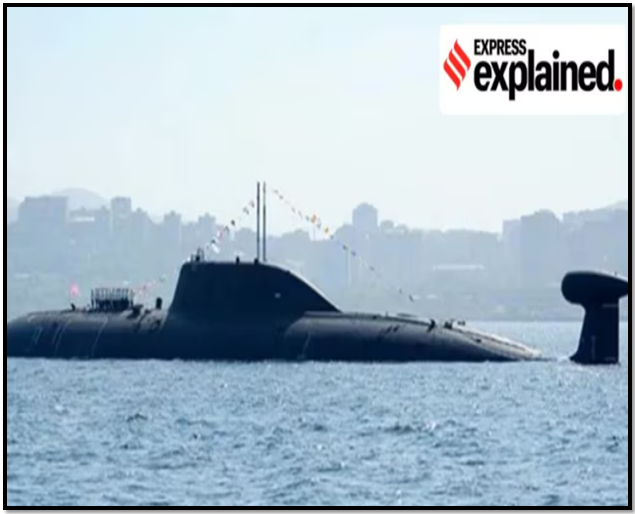“ARIGHAAT- INDIA’S SECOND NUCLEAR SUBMARINE”
Syllabus:
- GS 3: Defence technology
Why in the News?
India’s second nuclear submarine, INS Arighaat, was commissioned yesterday, augmenting India’s nuclear warships and deterrence capabilities, symbolizing significant progress in civil defence technology.
Source: Indian express
Introduction
- INS Arighaat launch marks an important milestone in India’s defense capabilities, enhancing its three nuclear warships with advanced submarines.
- Development reflects India’s progress towards self-reliance in defense technology, strengthen its maritime capabilities and contributing to national security by enhancing indigenous innovation.
India’s nuclear triad
Nuclear deterrence
- INS Arighaat addition to the Indian Navy significantly enhances India’s nuclear triad, which is an integral part of its nuclear deterrence strategy.
- Nuclear triad refers to the capability to launch nuclear weapons from land, air and sea on, Allowing for a safe second shot.
- With the launch of Arighaat, India will join a select group of countries — including the US, Russia, China and France — that have nuclear capabilities of this magnitude
INS Arighaat range capability
- INS Arighaat is India’s first SSBN a vast improvement over its predecessor INS Arihant.
- Equipped with state-of-the-art technology and internally developed systems, making it more reliable and trustwothry.
- Arighaat is powered by a small pressurized hydro nuclear reactor with a capacity of 83 MW, which enhances its stealth and survivability compared to traditional diesel and electric submarines.
Industrialization and Indigenous Elements
Increased participation
- Construction of INS Arighaat is an important step in India’s efforts to establish itself in the defence industry.
- The submarine encourages state-of-the-art facilities, with approximately 60% of the systems and equipment developed locally.
- This is a significant increase from INS Arihant’s 30% indigenous content, reflecting India’s progress in indigenous manufacturing of advanced defence technologies.
Industrial and technical development
- The development of Arighaat involves complex technology, advanced manufacturing and specialized infrastructure.
- This achievement is a proof to the capabilities of India’s defense-scientific community, including Department of Atomic Energy (DAE) and Defense Research and Development Organization (DRDO).
- Moreover, submarine is developed with contribution of both public and private partners, showcasing India’s defence- industrial ecosystem.
Sea-based nuclear deterrence strategy- Strategic Relevance
Reliability
- The sea-based leg of the nuclear triad represented by Arighaat and other SSBNs is considered the most reliable and survivable nuclear deterrent.
- Unlike land-based missiles and nuclear weapons pitch the air, SSBNs can be concealed underwater, making it less likely that they will have a strike capability first, thus deterring potential adversaries from planning nuclear advances.
Adherence to “no first use” policy
- “No First Use” policy on which India’s nuclear doctrine is based on, means India will not be First to use nuclear weapons in war.
- The launch of INS Arighaat strengthens this policy by providing a reliable second-strike capability, ensuring that India can respond authoritatively to any nuclear strike.
Maintaining global and regional stability
Balance of power
- INS Arighaat deployment enhances India’s strategic position in the Indian Ocean region and contributes to regional stability.
- As increasing security challenges and the presence of nuclear-armed states in the region, India’s robust sea-based nuclear solution acts as a deterrent to potential threats and helps to balance strategic a through operations, thus preventing any one country from dominating the region militarily.
Encouraging Global order through deterrence
- With aim of encouraging nuclear deterrence, India aims to promote peace and stability in the region.
- Strong nuclear deterrence discourages adversaries from acting aggressively or initiating conflict and war like situation, thereby reducing the likelihood of nuclear escalation.
- Indian Navy’s induction of Arighaat indicate India’s strong determination to maintain peace and stability in the region through strength and defence capabilites.
Future possibilities and opportunities
Expansion of Indigenous power
- Arighaat’s successful commission mark the way for future growth and development in India’s submarine capabilities and strength.
- Understanding developed from the construction and operation of Arighaat can be used to develop and evolve more advanced SSBNs and conventional submarines.
- This experience will help to,
- reduce dependence on foreign technology and suppliers
- enhance India’s strategic autonomy in defence sector.
Technological and commercial impact
- The construction of INS Arighaat economic implications like
- Enhances productivity
- Inspires the defence sector players
- Creation of jobs
- Encourage innovation,
- helps boost India’s defence-industrial complex
- Continued investment in such projects would not only strengthen national security but also generate economic benefits through increased employment and technological development.
Expanding knowledge while navigating challenges
- Arighaat is a significant achievement, while also poses challenges like
- technical, operational and training requirements.
- However, these challenges provide opportunities for growth and development within the security sector.
- Overcoming these obstacles will enhance the skills and capabilities of the Indian Navy and scientists and foster a culture of innovation and continuous improvement.
Conclusion
INS Arighaat’s commissioning has boosted India’s defence capabilities showing its strategic commitment to global and regional stability.
Source:Indian Express
Mains Practice Question:
Analyse the launch of arighaat in strengthening India’s sea-based defence capabilities, how it will contribute to global and regional stability while maintaining nuclear deterrence.
Associated article:




